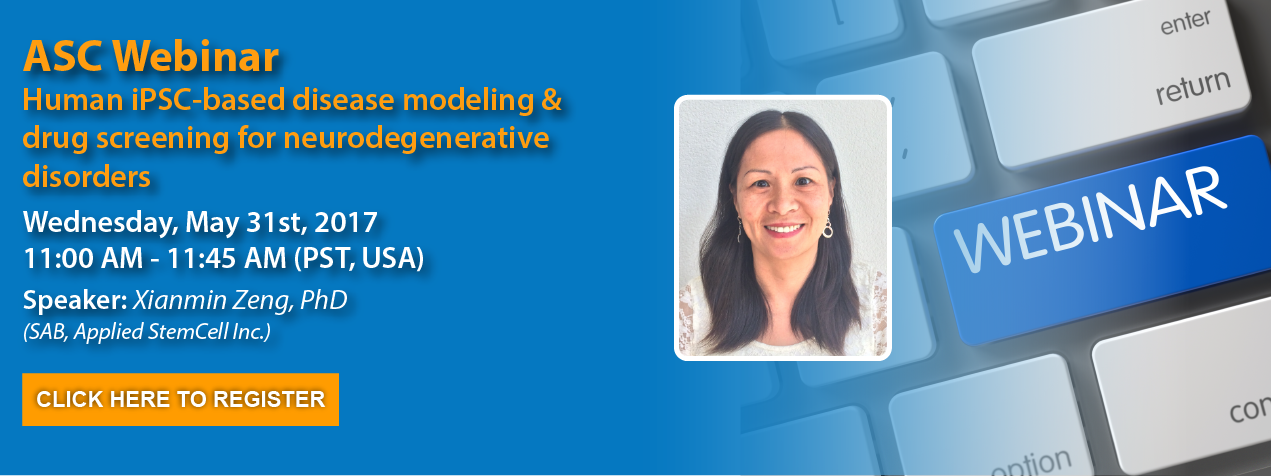Newsletter
FREE WEBINAR- Human iPSC-based disease modeling & drug screening for neurodegenerative disorders; May 31, 2017 11:00 am | ASC
Human iPSC-based disease modeling & drug screening for neurodegenerative disorders
Dr. Xianmin Zeng
Scientific Advisory Board, Applied StemCell, Inc.
Abstract
Human induced pluripotent stem cell (iPSC) technology offers the benefits of a cell line coupled with the advantage of using human primary cells. Additionally, iPSCs are also amenable to genome editing, and engineered iPSCs and their isogenic control lines can be terminally differentiated into cells of multiple lineages. This presents an almost limitless access to relevant and predictive disease models for basic research, drug discovery, toxicity screening and hopefully for regenerative cell therapy. In this webinar, we will elaborate on a panel of iPSC lines engineered for neurotoxicity assays and disease modeling. The cell lines in this panel include: 1) control lines, 2) patient-specific lines, 3) lineage-specific knock-in reporters, 4) isogenic controls of single and double knock-outs. We have also established scalable protocols for generating differentiated cells in an assay ready format. This talk will focus on the utility of these lines for neurotoxicity assays, including assays to determine the specificity of different neural cell types for a small range of chemicals and drugs from the Tox21 library, as well as for neuroprotective assays with dopaminergic neurons.
Highlights of this webinar:
- Overview of iPSC genome editing and differentiation technology
- Panel of engineered iPSCs for neurotoxicity assays
- Neural differentiation and neurotoxicity/ neuroprotection screening assays
- FAQs
Who should attend
Researchers who are interested in:
- Stem Cells
- Drug Discovery and Drug Screening
- Neuroscience and Neurodegenerative disorders
- Stem Cell Gene Editing and Differentiation
- Cell Line Disease Modeling
About the speaker:
Dr. Xianmin Zeng is a renowned expert in human embryonic stem cells (ESC) and induced pluripotent stem cells (iPSC) and a scientific advisory board (SAB) member of Applied StemCell . Her research focuses on neural development in humans, and in using patient-specific and engineered isogenic lines to model neurodegenerative diseases, particularly that of Parkinson's disease. She has also developed scalable processes for deriving functional neuronal cells of various lineages from ESCs/iPSCs for cell therapies and drug screening. Dr. Zeng received her PhD in Molecular Biology from the Technical University of Denmark in 2000. As a Director and Associate Professor at the California Institute for Regenerative Medicine (CIRM) in the Buck Institute for Age Research, Dr. Zeng has been a recipient of several prestigious grants, including a translational grant to develop clinical grade dopaminergic neurons from pluripotent stem cells for Parkinson's disease therapy.



